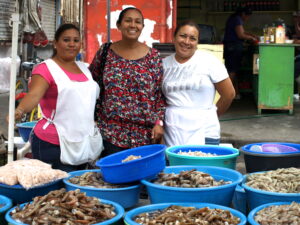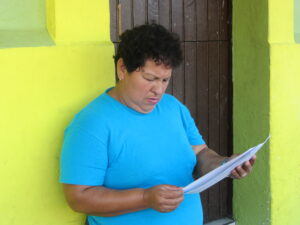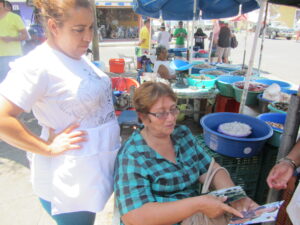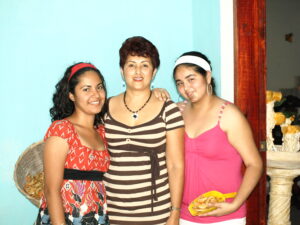Engaged Anthropology Grant: Maria Cruz-Torres and “The Shrimp Ladies”
Another Engaged Anthropology Grant report is in, this time from Dr. Maria Cruz-Torres of Arizona State University! Cruz-Torres was originally awarded funding in 2008 to aid research on her project ‘The Shrimp Ladies: A Political Ecology of Gender, Fisheries and Grassroots Movements in Northwestern Mexico.’ Last year, she received the EAG to return to Sinaloa to make her research results available to the general public, and to ensure that women’s voices are central in this process.

Throughout the duration of my fieldwork in Southern Sinaloa, from 2004-2013, women shrimp traders always asked me about what will I do with the information they have given me. Was I going to write a book? Will it be published in English or Spanish? Will it be published in Mexico or in the USA? Will they be able to read and understand it? An Engaged Anthropology Grant allowed me to solve this dilemma by facilitating a closer interaction and collaboration with the women shrimp traders in order to come up with ideas on how to better reciprocate their help and support to my long-term ethnographic research. After several meetings and consultations, both individually, and in groups, with the women, we agreed that the publication in Mexico of a non-academic book in Spanish, will fulfill their wishes and rights to read about their contributions to my research. They also wanted the book to highlight their legacies as working women, and their contribution to their households and to the local economy.

On December of 2012 I met with many of the women shrimp traders in Southern Sinaloa to discuss the details of the book. I visited all of the eight communities (Mazatlán, Villa Unión, Walamo, Escuinapa, Palmillas, Isla del Bosque, Cristo Rey, and Agua Verde) in which I had conducted fieldwork to contact the women who participated in the research and to seek their individual opinions and suggestions. I had brought an outline that I developed based on their previous input. Most women voiced their concerns, and many felt that the proposed book still seemed very academic, which would be difficult for them to read. There was a consensus among the women that the book should be about who they are and the challenges they face as shrimp traders, and narrated from their individual perspectives. We agreed that the book should be a compilation of women testimonies told with their own voices. A photograph of each woman will be included in the testimony. The life histories I collected during my fieldwork in Southern Sinaloa in 2008, also funded by a Wenner-Gren Postdoctoral Grant, form the basis of these testimonies.

On May of 2013 I met with the shrimp traders again to discuss their individual testimonies and photographs. During this time the women had the opportunity to review their testimonies in order to add new or delete old information. They edited what information they wanted people to learn about them. Given the violence that has been taking place in Southern Sinaloa during the last three years, some women were reluctant to reveal too much personal information and this was deleted from their testimonies. Others updated their demographic information such as age, education, and marital status; major family events, new challenges at work, and new economic opportunities. Some women became very emotional while reading their testimonies, remembering, both happy, and sad events in their lives. Women also had the opportunity to choose their photographs to accompany their testimonies. In many cases it was necessary to shoot new portraits because women did not like the one I chose or because they needed to be updated. We also discussed and created a new title for the book.

The testimonies shed light on the many struggles women overcame so they could pursue their livelihoods and these also offered a rare glimpse at their individual lived experiences. They addressed four important questions: Who are the women shrimp traders of Southern Sinaloa? What is like to be a woman shrimp trader? What were the complex processes by which women became shrimp traders? How do women reconcile their various roles as workers, mothers, wives, sisters, and daughters? But the most common themes that emerge from these testimonies are: women’s struggles to overcome poverty; issues of health, sickness and death; Other themes such as motherhood, social and economic change, resistance and empowerment, violence, children’s education, and their hopes for the future, also stood out.
The book, now entitled, Voces en el Tiempo: La Vida y el Trabajo de Las Camaroneras del Sur de Sinaloa (Voices inTimes: The Life and Work of Women Shrimp Traders in Southern Sinaloa) compiles forty of these poignant testimonies, and it will be published by the University of Sinaloa Press. Once published, the book will be freely distributed among the women who collaborated in the study and their families, libraries, colleagues, and anthropology students in Sinaloa.